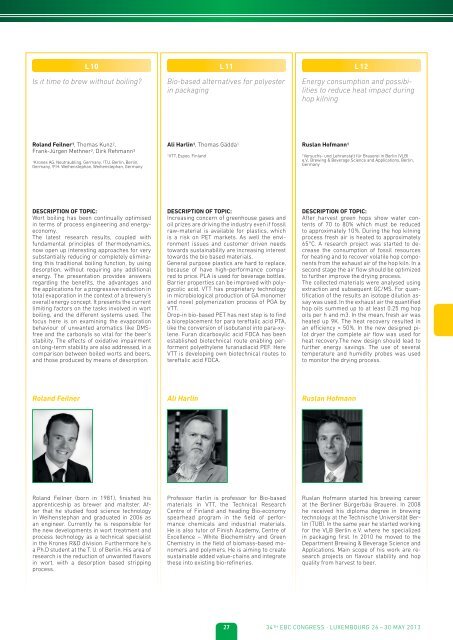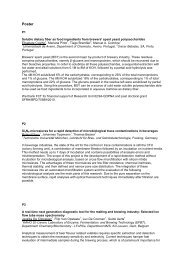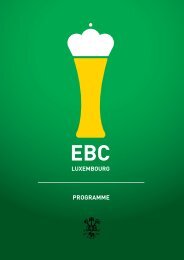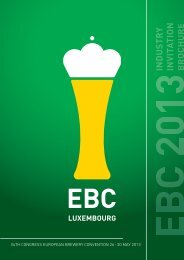please click here for download. - the 34th European Brewery ...
please click here for download. - the 34th European Brewery ...
please click here for download. - the 34th European Brewery ...
Create successful ePaper yourself
Turn your PDF publications into a flip-book with our unique Google optimized e-Paper software.
L 10<br />
Is it time to brew without boiling?<br />
L 11<br />
Bio-based alternatives <strong>for</strong> polyester<br />
in packaging<br />
L 12<br />
Energy consumption and possibilities<br />
to reduce heat impact during<br />
hop kilning<br />
Roland Feilner 1 , Thomas Kunz 2 ,<br />
Frank-Jürgen Methner 2 , Dirk Rehmann 3<br />
1Krones AG, Neutraubling, Germany, 2 T.U. Berlin, Berlin,<br />
Germany, 3F.H. Weihenstephan, Weihenstephan, Germany<br />
Ali Harlin 1 , Thomas Gädda 1<br />
1VTT, Espoo, Finland<br />
Ruslan Hofmann 1<br />
1Versuchs- und Lehranstalt für Brauerei in Berlin (VLB)<br />
e.V., Brewing & Beverage Science and Applications, Berlin,<br />
Germany<br />
DESCRIPTION OF TOPIC:<br />
Wort boiling has been continually optimised<br />
in terms of process engineering and energyeconomy.<br />
The latest research results, coupled with<br />
fundamental principles of <strong>the</strong>rmodynamics,<br />
now open up interesting approaches <strong>for</strong> very<br />
substantially reducing or completely eliminating<br />
this traditional boiling function, by using<br />
desorption, without requiring any additional<br />
energy. The presentation provides answers<br />
regarding <strong>the</strong> benefits, <strong>the</strong> advantages and<br />
<strong>the</strong> applications <strong>for</strong> a progressive reduction in<br />
total evaporation in <strong>the</strong> context of a brewery‘s<br />
overall energy concept. It presents <strong>the</strong> current<br />
limiting factors on <strong>the</strong> tasks involved in wort<br />
boiling, and <strong>the</strong> different systems used. The<br />
focus <strong>here</strong> is on examining <strong>the</strong> evaporation<br />
behaviour of unwanted aromatics like DMSfree<br />
and <strong>the</strong> carbonyls so vital <strong>for</strong> <strong>the</strong> beer‘s<br />
stability. The effects of oxidative impairment<br />
on long-term stability are also addressed, in a<br />
comparison between boiled worts and beers,<br />
and those produced by means of desorption.<br />
DESCRIPTION OF TOPIC:<br />
Increasing concern of greenhouse gases and<br />
oil prizes are driving <strong>the</strong> industry even if fossil<br />
raw-material is available <strong>for</strong> plastics, which<br />
is a risk on PET markets. As well <strong>the</strong> environment<br />
issues and customer driven needs<br />
towards sustainability are increasing interest<br />
towards <strong>the</strong> bio based materials.<br />
General purpose plastics are hard to replace,<br />
because of have high-per<strong>for</strong>mance compared<br />
to price. PLA is used <strong>for</strong> beverage bottles.<br />
Barrier properties can be improved with polygycolic<br />
acid. VTT has proprietary technology<br />
in microbiological production of GA monomer<br />
and novel polymerization process of PGA by<br />
VTT.<br />
Drop-in bio-based PET has next step is to find<br />
a bioreplacement <strong>for</strong> para tereftalic acid PTA,<br />
like <strong>the</strong> conversion of isobutanol into para-xylene.<br />
Furan dicarboxylic acid FDCA has been<br />
established biotechnical route enabling per<strong>for</strong>ment<br />
polyethylene furanadiacid PEF. Here<br />
VTT is developing own biotechnical routes to<br />
tereftalic acid FDCA.<br />
DESCRIPTION OF TOPIC:<br />
After harvest green hops show water contents<br />
of 70 to 80% which must be reduced<br />
to approximately 10%. During <strong>the</strong> hop kilning<br />
process fresh air is heated to approximately<br />
65°C. A research project was started to decrease<br />
<strong>the</strong> consumption of fossil resources<br />
<strong>for</strong> heating and to recover volatile hop components<br />
from <strong>the</strong> exhaust air of <strong>the</strong> hop kiln. In a<br />
second stage <strong>the</strong> air flow should be optimized<br />
to fur<strong>the</strong>r improve <strong>the</strong> drying process.<br />
The collected materials were analysed using<br />
extraction and subsequent GC/MS. For quantification<br />
of <strong>the</strong> results an isotope dilution assay<br />
was used. In <strong>the</strong> exhaust air <strong>the</strong> quantified<br />
hop oils summed up to at least 0.25 mg hop<br />
oils per h and m3. In <strong>the</strong> mean, fresh air was<br />
heated up 9K. The heat recovery resulted in<br />
an efficiency > 50%. In <strong>the</strong> new designed pilot<br />
dryer <strong>the</strong> complete air flow was used <strong>for</strong><br />
heat recovery.The new design should lead to<br />
fur<strong>the</strong>r energy savings. The use of several<br />
temperature and humidity probes was used<br />
to monitor <strong>the</strong> drying process.<br />
Roland Feilner<br />
Ali Harlin<br />
Ruslan Hofmann<br />
Roland Feilner (born in 1981), finished his<br />
apprenticeship as brewer and maltster. After<br />
that he studied food science technology<br />
in Weihenstephan and graduated in 2006 as<br />
an engineer. Currently he is responsible <strong>for</strong><br />
<strong>the</strong> new developments in wort treatment and<br />
process technology as a technical specialist<br />
in <strong>the</strong> Krones R&D division. Fur<strong>the</strong>rmore he‘s<br />
a Ph.D student at <strong>the</strong> T. U. of Berlin. His area of<br />
research is <strong>the</strong> reduction of unwanted flavors<br />
in wort, with a desorption based stripping<br />
process.<br />
Professor Harlin is professor <strong>for</strong> Bio-based<br />
materials in VTT, <strong>the</strong> Technical Research<br />
Centre of Finland and heading Bio-economy<br />
spearhead program in <strong>the</strong> field of per<strong>for</strong>mance<br />
chemicals and industrial materials.<br />
He is also tutor of Finish Academy, Centre of<br />
Excellence – White Biochemistry and Green<br />
Chemistry in <strong>the</strong> field of biomass-based monomers<br />
and polymers. He is aiming to create<br />
sustainable added value-chains and integrate<br />
<strong>the</strong>se into existing bio-refineries.<br />
Ruslan Hofmann started his brewing career<br />
at <strong>the</strong> Berliner Bürgerbäu Brauerei. In 2008<br />
he received his diploma degree in brewing<br />
technology at <strong>the</strong> Technische Universität Berlin<br />
(TUB). In <strong>the</strong> same year he started working<br />
<strong>for</strong> <strong>the</strong> VLB Berlin e.V. w<strong>here</strong> he specialized<br />
in packaging first. In 2010 he moved to <strong>the</strong><br />
Department Brewing & Beverage Science and<br />
Applications. Main scope of his work are research<br />
projects on flavour stability and hop<br />
quality from harvest to beer.<br />
27 34 TH EBC CONGRESS · LUXEMBOURG 26 – 30 MAY 2013





